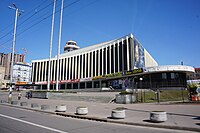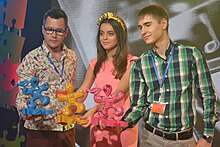|
Junior Eurovision Song Contest 2013
The Junior Eurovision Song Contest 2013 was the 11th edition of the annual Junior Eurovision Song Contest. It took place in Kyiv, Ukraine on 30 November 2013.[1][4] The venue for the contest was announced on 17 April 2013, as the Palace "Ukraine".[5] Ukrainian broadcaster National Television Company of Ukraine (NTU) was the host broadcaster for the event.[4] It was the second time the contest was held in Kyiv, the first being the 2009 contest. It was also the second time in the history of the Junior Eurovision Song Contest that the event took place in last year's winning country, as well as the first time that the event was held in the same city twice. A total of twelve countries participated, with Macedonia and Malta making a return,[6][7] and Albania,[8] Belgium[9] and Israel choosing to withdraw.[10] San Marino made their debut in the contest.[11] Cyprus was originally the thirteenth country to take part but pulled out the last minute.[12] Gaia Cauchi representing Malta won the contest with the song "The Start". This was Malta's first Junior Eurovision victory as well as their first victory in any Eurovision competition.[3] It also marked the first time in the history of the contest that a winning entry was sung entirely in English. This was also the first contest to introduce a new awards system: The winning country along with the second and third place countries each received a trophy. Sofia Tarasova, representing the host nation Ukraine, took second place and Ilya Volkov singing for Belarus took the third-place trophy. Location The European Broadcasting Union invited broadcasters to bid for the rights to host the contest.[13] On 12 February 2013, the Ukrainian national broadcaster NTU and EBU announced that the 2013 contest would take place in Kyiv.[1] Palace "Ukraine" was confirmed as the host venue on 17 April.[5] The venue which is also known as the Ukrainian National Palace of Arts, better known as Palace "Ukraine" which is a venue administered by the State Directory of Affairs inside their public enterprises division and is one of the main venues for official events along with Palace of Sports in Kyiv, Ukraine, which hosted the 2009 contest.[14] It was opened in 1970 as the biggest centre of culture and arts. The building was designed by a group of architects P. Zhylytskyi, I. Vayner, under the directorship of the project's author the distinguished architect of Ukrainian SSR Yevhenia Marychenko.[15] All of the architects were awarded Shevchenko National Prize (1971) for its design and construction. The building is trapezoidal, twenty eight meters tall and consists of over 300 rooms. Participating countries On 4 November 2013, it was confirmed that twelve countries would be taking part in the contest.[16] Prior to that, in October, it was announced that the executive supervisor managed to maintain the participation of thirteen countries for the contest in Kyiv, Ukraine.[17] The name of the thirteenth country was expected to be announced by the European Broadcasting Union on 29 October 2013.[17] It was later confirmed on 1 November 2013 that Cyprus were going to be the thirteenth country but withdrew at the last minute.[12] This was the lowest number of entries since 2009, equalling the number of participants in 2012. San Marino made their debut, Macedonia returned after a one-year absence and Malta returned after a two-year absence. Albania and Israel withdrew after debuting in the 2012 edition, while Belgium withdrew for the first time since 2003. Prior to the event, a digital compilation album featuring all the songs from the 2013 contest, along with karaoke versions, was put together by the European Broadcasting Union and released by Universal Music Group on 22 November 2013.[18]
Format The executive supervisor of the Junior Eurovision steering group, Vladislav Yakovlev, announced on 17 July 2013 that there would be some changes being introduced to the contest from 2013 onwards. The contest would no longer focus on just the winning entry, but would also award prizes to the top three entries in acknowledgement of the talents of the young performers.[20] It was also announced that the winner of Junior Eurovision 2013 would be at the Eurovision Song Contest 2014, however the role that they would play had not been revealed at that time.[21] The running order draw took place on 25 November 2013 during the contest's opening party.[22][23] Graphic designDesigner Elias Ledakis, who was responsible for the stage design of the Eurovision Song Contest 2006 in Athens, Greece, was announced on 7 October 2013 as also being the designer for the 2013 Junior Eurovision stage.[17] Radio broadcastThe official Junior Eurovision Twitter account revealed on 9 October that the contest was planned to be broadcast online and by national broadcasters, however the details were still being worked on.[24] On 21 November 2013, it was revealed that 98.8 Castle FM in Scotland would be the only radio station broadcasting the ceremony in the United Kingdom.[25] Radio Ukraine International would also be broadcasting the contest live. Hosts On 30 September 2013, it was confirmed that Timur Miroshnychenko would host the contest alongside Zlata Ognevich.[26][27] Contest overview The event took place on 30 November 2013 at 20:00 EET (19:00 CET). Twelve countries participated, with the running order published on 25 November 2013.[22] All the countries competing were eligible to vote with the jury and televote, as well as a Kids Jury, eligible to vote. Malta won with 130 points, with Ukraine and Belarus completing the top three.[20] San Marino, Moldova, and Macedonia occupied the bottom three positions.[28] The show began with two children, Andriy Boiko and Liza Kostiakina,[29] doing a puzzle of this year’s logo, Puzzle Man. The opening number featured several fairytale scenes with dancers and musicians on the stage, with LED screens and movable parts and puzzle pieces floating above the stage also featured.[30] The interval included Eurovision 2013 winner Emmelie de Forest performing "Only Teardrops", all participants performing the theme song "Be Creative", last year's winner Anastasiya Petryk and Zlata Ognevich also performed on stage.[31][32] Some hours before the start of the contest Ruslana withdrew from performing at the event,[33] motivated by the violent actions of the Ukrainian authorities against the pro-European Union protests that were happening near the contest's venue.[34]
Spokespersons The order in which each country announced their votes was in the order of performance. The running order draw took place on 25 November 2013 during the contest's opening party.[22][23] The spokespersons from all of the participating countries are shown below alongside their respective country.[35][36][better source needed]
Detailed voting results
12 pointsBelow is a summary of all 12 points received. All countries were given 12 points at the start of voting to ensure that no country finished with nul points.
Other countries
BroadcastsMost countries sent commentators to Kyiv or commentated from their own country, to add insight to the participants and, if necessary, provide voting information.[35][36] For the first time, the official Junior Eurovision website featured commentary online during the broadcast with commentary from the website's editor Luke Fisher and radio broadcaster Ewan Spence.
See also
References
External linksWikimedia Commons has media related to Junior Eurovision Song Contest 2013. |
||||||||||||||||||||||||||||||||||||||||||||||||||||||||||||||||||||||||||||||||||||||||||||||||||||||||||||||||||||||||||||||||||||||||||||||||||||||||||||||||||||||||||||||||||||||||||||||||||||||||||||||||||||||||||||||||||||||||||||||||||||||||||||||||||||||||||||||||||||||||||||||||||||||||||||||||||||||||||||||||||||||||||||||||||||||||||||||||||||||||||||||||||||||||||||||||||||||||||||||||||||||||||||||||||||||||||||||||||||||||||||||||||||||||||||||||||||||||||||||||||||||

